We eat more meat than ever before. Since 1960, we have increased the global meat consumption by 5 times. Sure, we have become more people on this planet, but not THAT many. In other words: each person eats in average a lot more meat today than 60 years ago.
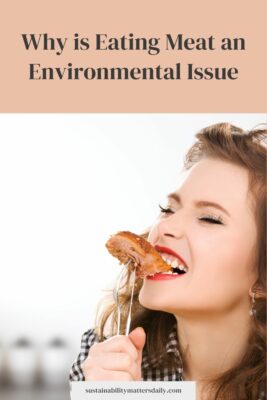
Table of Contents
- Where exactly do these co2 emissions come from?
- Total meat consumption by numbers
- The Facts: Why Meat Production is Bad for the Environment
- Guide: This is how You Limit the Amount of Food You Eat
- Cultural recommendations: Want to know more about the topic?
- Key takeaways: What did we learn from this article?
But why is eating meat bad for the environment?
The answer is a combination of land usage and greenhouse gas emissions. About 90 % of all deforestation can be traced back to the meat industry. In addition to that, animal agriculture is responsible for between 15 and 20 % of the total greenhouse gas emissions globally. These are huge environmental problems.
Do you want to know more?
Well, let us dig a bit deeper into the numbers.
Where exactly do these co2 emissions come from?
Let’s start with something easy. In order to understand the full picture, we need to take a step back and ask ourselves: who are to blame for all these greenhouse gas emissions?
I understand that it might be a bit difficult to understand exactly why meat production counts for about 15-20 % of all greenhouse gas emissions. In order to describe that in an easy and user-friendly way, I made the following table:
| "Industry" | Why is it harmful for the environment? | Example/"fun fact" | Useful article |
|---|---|---|---|
Deforestation | Forests is the number one tool to prevent global warming to accelerate. Many forests and rainforests are chopped down in order to make cettle farms. | Cattle farming counts for 80 % of the deforestation rates in the Amazon rainforest. | "What makes the Amaazon Rainforest so important" - Sustainability Matters |
Methane emission from cows | When cows burp and fart, methane is released into the atmosphere. Methane is even worse than CO2 in regards to global warming. The more cows that exists on the planet on any given time, the quicker global warming will accelerate. | N/A | "Methane isn't just cow farts" - Ted Talk Official Website |
Transportation  | The meat has to leave the farm and get to your local shop. That's quite a process. An awful lof of the "premium meat" is imported from other countries. | Brazil is the world's largest exporter of beef. | The World's Largest Exporters of Beef by Worldatlas.com |
Food waste  | Most meat and diary products have a low lifetime span. In other words: people throw out a lot of the meat & milk that they're buying. That creates a huge environmental issue. | Households are wasting around 570,000 tonnes of fresh meat each year. | "The meat we eat - or don't eat" (By The Guardian) |
I really hope that this helped to understand why the meat industry hurts the planet so much.
Later in the article, I will give very specific examples of every pollution source.
Total meat consumption by numbers
Our World In Data currently holds the most reliable statistics on meat consumption. They published this useful graph based on reports from the UN Food and Agricultural Organization:
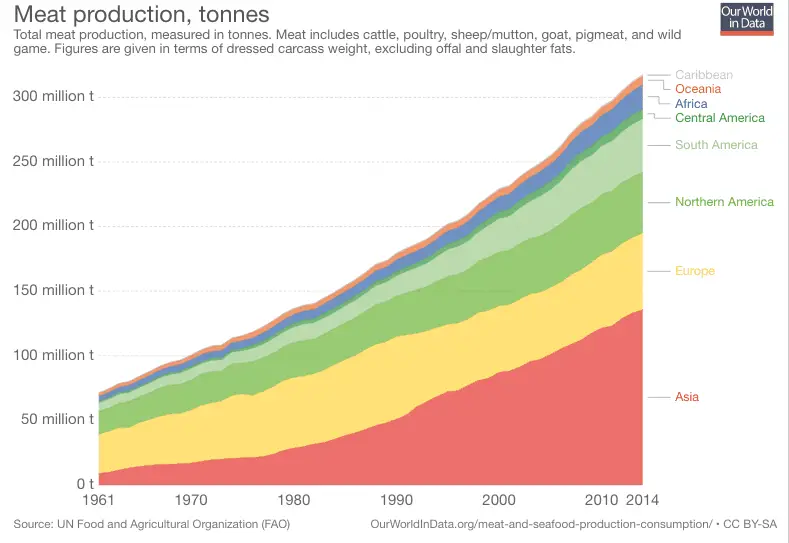
As you might see, the graph divides different geographical regions based on how much meat that is PRODUCED (not consumed) in the various regions. As you might see, Asia is the continent that grew the most. The reason for that? Well, we know that there is a strong correlation between GDP per capita (how rich a country is) and how much meat is consumed by its citizens.
Europe actually had a decline since 1990. It does not necessarily mean that less meat is consumed in Europe, but we also know that there has been a dramatic increase of imported food. If you combine that with the big “vegan movement” that is currently going on in North European countries, it sort of draws the full picture of why we now (finally) see less meat being produced in Europe.
So we know that we eat more meat than ever before – and that this number, by all means, will increase over the next 50 years.
But why is this bad for me, you and the environment?
The Facts: Why Meat Production is Bad for the Environment
The Example: Cattle ranching in The Amazon
Amazon is the biggest rainforest on the planet. How big the deforestation rate in South America is various based on the sources you trust, but official numbers say that we lost about 40 % of The Amazon over the last 40 years. This specific rainforest has gone from covering 14 % of the total landscape of the earth to cover less than 6 %. Needless to say, this will have a huge negative impact on the environment.
We also know that 80 % of all the deforestation can be traced back to cattle ranching.
The deforestation of the Amazon started to get attention back in 1980. Back then, it was named “the hamburger connection”. In recent years, McDonalds and other fast-food chains have been proven to have direct connections with livestock farms in The Amazon.
“Fun facts” about the meat industry and its environmental impact
By “fun facts”, I don’t really mean that they are much fun. What I mean is that they are quite mind-blowing facts that are suitable to bring up during a discussion while eating a turkey during Thanksgiving Day.
– 50 % of all the freshwater in the US is used to raise animals that are going to be eaten.
– The average pig farm in Europe and US generates the same waste amount as 10,000 human citizens in New York. As we know that waste is another growing environmental problem, we might soon stop this madness?
– Only 5 % of all the oat produced are meant to be eaten by humans. The rest is meant to feed livestock.
If you want to read more facts like this, you can read the article “How does veganism really help the animals and environment?” and „What is sustainable eating?“
Guide: This is how You Limit the Amount of Food You Eat
“Eat less meat!” is one of the best advices you can give someone that want to live a more environmentally friendly lifestyle. However, you need to give clearer instructions if you want to have the hope of changing anything.
I have personally gone from eating 7-8 to 1-2 meat dishes weekly. I know what it takes to dramatically reduce the amount of meat you are eating. These are my tips:
Make more vegan or vegetarian food
Start reading vegan blogs. Most people look at the vegan community and think that they are some weird hippies that smoke joints and cry whenever they accidentally step on a bug in the woods. That is not correct.
There are hundreds of useful vegan blogs with recipes that are SO good that you would never miss meat again. I will be the first one to admit that I was extremely skeptical when I swapped meat with vegetables. “Really? A dinner without meat? How is that possible?!”.
Guess what – it is highly possible. You just need to get some inspiration.
Educate yourself about the environmental impact of meat
Once you start to read articles like this, you will hopefully get less and less taste of meat. If you care the slightest about the environment, you should reduce the amount of meat you eat.
This article does not even cover the health aspect, but that is a quite significant factor as well.
Try to make your first vegetarian meal
These are just some suggestions that I give based on what I found easiest:
– Spaghetti/pasta with pesto and sour cream
– Noodles with fried vegetables
– Veggie lasagna
– “The Impossible Burger” or similar products that try to replicate the taste, feeling and density of meat.
– A big sandwich filled with tomatoes, cucumber, cheese and jalapenos. If you want to make it extra nice: feel free to put it in the toaster or the oven for some minutes. DELICIOUS!
Cultural recommendations: Want to know more about the topic?
I have spent countless hours researching this topic on my own. Most of the information out there is quite hard to understand (very scientifically written by professors) or … dead boring.
However, there are three recommendations I would like to give you: one documentary and a book.
Book: “Meat Climate Change” – the best book about meat & global warming
First, let’s start with the book. In my opinion, this is a book that everyone should read.
“Meat Climate Change: The 2nd leading cause of global warming” is not only well-written and well-researched. It’s also quite entertaining. It explains how a meatless diet is a key tactic to reduce carbon footprint.
I’ve read a lot of books, but I have never been so blown away by facts as I have by this one.
- Seenarine, Dr Moses (Author)
- English (Publication Language)
- 348 Pages - 04/15/2016 (Publication Date) - Xpyr Press (Publisher)
Documentary: Food Inc
Let me first say: Food Inc is not a documentary about the meat industry. I very often find these pro-vegan documentaries to be biased and not very well-balanced.
“Food Inc” is about the American food industry. It explains WHY the government allows food production to destroy our environment – and it also explains why Americans keep getting fatter. Needless to say, it’s a lot about our meat consumption.
You can find the documentary on Netflix.
Food Inc trailer
Key takeaways: What did we learn from this article?
– If we reduce our meat consumption, we can reduce the carbon footprint with quite a lot.
– The total emissions of all activities related to production, processing and selling meat counts for between 15-20 % of the total greenhouse gas emissions.
– There isn’t one specific activity that counts for all of the emissions. It’s distributed across things like cattle farming, logistics, deforestation, and food waste.
– Going vegan or vegetarian are two terrific ways to reduce your carbon footprint. It doesn’t have to be a radical change.
I succeeded with eating less meat. It might sound very difficult, but it’s not. In fact, it’s all about finding the small “hacks” that makes it possible. Previously, I wrote a very nice guide that I called “7 innovative ways to reduce your meat consumption“.
I’m biased, but that’s an article I can really recommend. 🙂
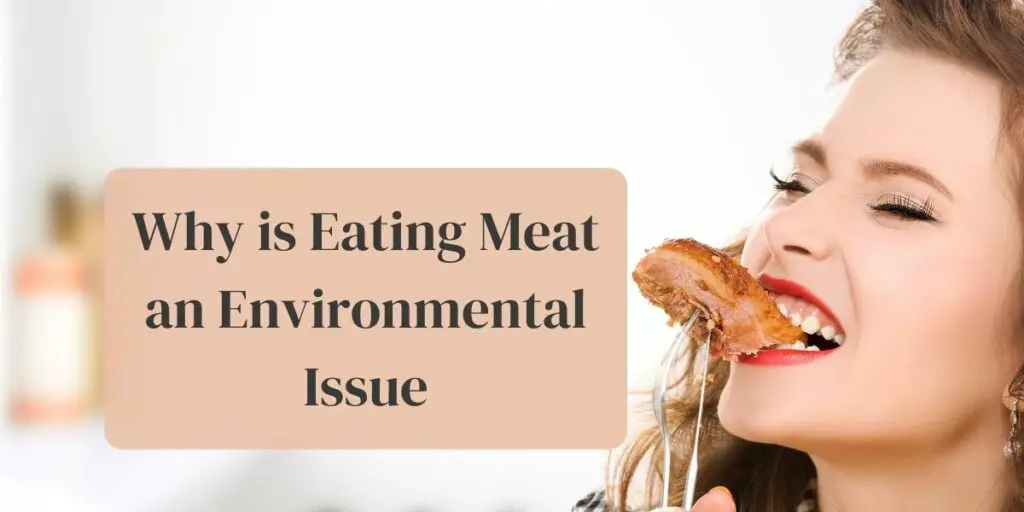

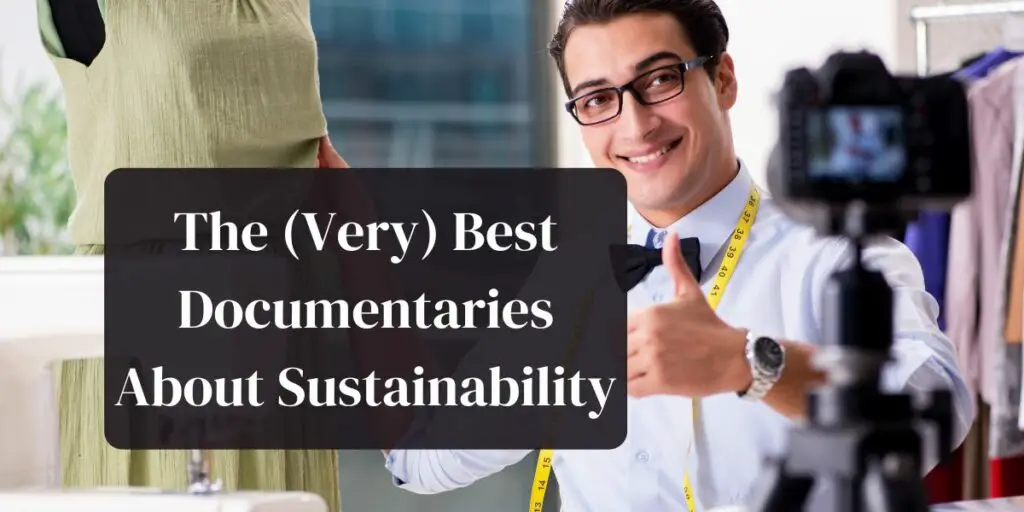
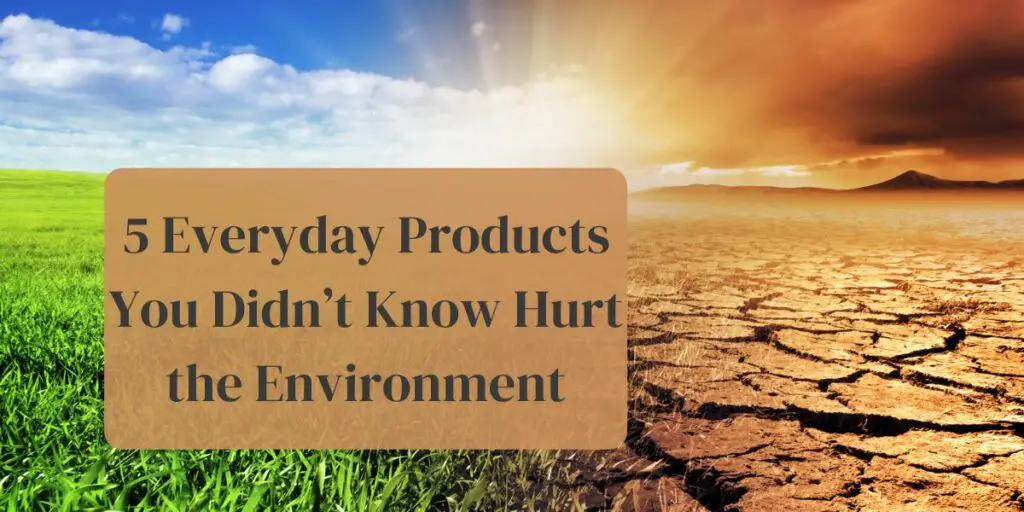
Why would I care even for a second about the Planet in the next 100 or 200 years, if my genes will degenerate and my children won’t survive a pant-only based diet? Why would I care about the planet if the human race could go extinct if we really move to such diet?
Meat is the ultimate food, it brings everything needed for a healthy meal and wait till you see how much land is needed to grow “sustainable” non-meat food to feed the same amount of people. Not only that, I don’t get my meat across the ocean, its locally grown, and its been that way for literally thousands of years, nothing have changed.
If you wish, go ahead and tell the Brazilians to stop cutting their forest, but don’t dictate me or people on the other side of the planet how to live.
Become a vegan and the planet will survive.
Eat meat and the next generation will be the last one to survive on our planet. Harsh, but true.
Great information, the carbon footprint of meat is certainly out of control compared to plants. I appreciate your experience cutting back from 7-8 times a week to 1-2, that makes a huge difference! Folks always think that you have to either be vegan or eat like a caveman but simply REDUCING animal products is a great step.
You’re not getting me to reduce my meat consumption by saying it’s dangerous for the planet. In year 2000, people said that we should stop eating beef unless we wanted winter-free winters. let me look outside the window here in moscow,,,,, OH ITS SNOW 🙂
I especially love the fact that you put all these different “emission sources” into one table. That made the article very useful 🙂
I am enrolled at Aalborg University in Denmark and will write my master topic about the environmental impact of the meat industry. It might not come as a shock when I say that I am very glad for this article 🙂
Bookmarked!
Hi Jepsper , thanks for your comment. I wrote my environmental bachelor thesis in Denmark as well, but a bit further South (Aarhus). 🙂
Good luck with yours and let me know if you got some questions!
I started being a vegetarian since 94 but still been eating meat from time to time but I’m going to try eat healthier so I will try going vegetarian or vegan or both again starting tomorrow cause I just ate meat unfortunately but it is bad for the earth
Frightening numbers. Looking at the meat production graph really makes me think that our planet is destroyed already. We can try to remove plastic straws from the shop and pretend that we have done something good for the environment, but unless we stop eating BEEF, we are literally doomed.
I am sorry for being pessimistic about this, but its true. We cant do anything as long as we keep eating beef in the same pace as we do now….and soon China will start to eat beef as well as they become richer for every day
Hello my German friend,
yes, you are right. I also get quite worried when I see the development. We have not yet met “peak meat”, which should be frightening to all the people that care about the environment.
Though these things are slightly misleading, as crop agriculture causes more emissions and uses less green water and more irrigated water. Majority of cattle water consumption is green water which comes from rain, and if the cattle did not ruminate the empty land they would die as those lands cannot be used for farming. The reality is going vegan does not solve the problem as cattle eat many of the waste products from our agriculture that we as humans cannot eat and would become toxic waste and converting it to more efficient energy for humans to consume.
Wow! Amazing! I learned a lot. I hope to be vegan one day!
Hi Shana, great that you learned something! 🙂
Good luck going vegan!
Best regards,